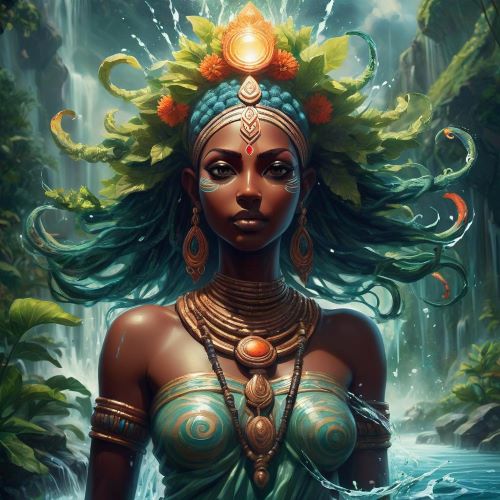Shona Gods
Shona Gods form the backbone of the spiritual beliefs and mythology of the Shona people, one of the largest ethnic groups in Zimbabwe. Deeply rooted in nature, ancestry, and cosmic balance, these gods play essential roles in the creation of the universe, the maintenance of moral order, and the connection between the living and the spirit world. The Shona pantheon is a complex system of divine beings, ancestors, and spiritual intermediaries that govern various aspects of life, from agriculture and rain to health and justice. These gods are not distant deities, but active and present forces in the day-to-day lives of the people.
At the center of Shona mythology is Mwari, also known as Musikavanhu, the Supreme God and Creator of all life. Mwari is believed to be omnipotent and omnipresent, responsible for the creation of the earth, the skies, and all living beings. Unlike many supreme deities, Mwari is both respected and feared, often approached through mediums or spiritual leaders during rituals and consultations. Sacred sites such as the Matobo Hills are believed to be dwelling places of Mwari, where communication between humans and the divine can occur through prayer, offerings, and ceremony.
Surrounding Mwari is a host of lesser Shona Gods and spiritual entities who serve specific functions. These include gods of the rain, fertility, health, hunting, and protection. Each has unique responsibilities and is invoked during ceremonies and seasonal events that align with agricultural or life-cycle needs. These gods often work in harmony with ancestral spirits, who are also honored and called upon for guidance and blessings. In Shona belief, the gods and ancestors form an interconnected spiritual world that influences the physical realm, offering protection, punishment, or reward based on human actions.
Rituals and ceremonies play a crucial role in maintaining a relationship with Shona Gods. Spirit mediums, known as “svikiro,” are chosen individuals who channel messages from the gods or ancestors. These mediums are central figures in Shona religious life, performing rites, interpreting signs, and offering advice to individuals and communities. Music, dance, and drumming accompany many of these rituals, serving as tools to enter trance states and invite divine presence. Through these sacred practices, the Shona ensure that the gods remain part of the community’s fabric, protecting the land and people.
Today, the reverence for Shona Gods remains strong in rural communities and continues to influence cultural identity and traditional practices. Even as Christianity and modern beliefs have spread throughout Zimbabwe, many Shona people continue to honor their ancestral gods, especially during key life events like births, marriages, and harvests. These gods represent a profound connection to heritage, nature, and the spirit world, offering timeless wisdom and guidance. Understanding Shona Gods provides valuable insight into a belief system where the divine is ever-present and deeply embedded in the land, people, and daily experiences.
Shona Gods form the backbone of the spiritual beliefs and mythology of the Shona people, one of the largest ethnic groups in Zimbabwe. Deeply rooted in nature, ancestry, and cosmic balance, these gods play essential roles in the creation of the universe, the maintenance of moral order, and the connection between the living and the spirit world. The Shona pantheon is a complex system of divine beings, ancestors, and spiritual intermediaries that govern various aspects of life, from agriculture and rain to health and justice. These gods are not distant deities, but active and present forces in the day-to-day lives of the people.
At the center of Shona mythology is Mwari, also known as Musikavanhu, the Supreme God and Creator of all life. Mwari is believed to be omnipotent and omnipresent, responsible for the creation of the earth, the skies, and all living beings. Unlike many supreme deities, Mwari is both respected and feared, often approached through mediums or spiritual leaders during rituals and consultations. Sacred sites such as the Matobo Hills are believed to be dwelling places of Mwari, where communication between humans and the divine can occur through prayer, offerings, and ceremony.
Surrounding Mwari is a host of lesser Shona Gods and spiritual entities who serve specific functions. These include gods of the rain, fertility, health, hunting, and protection. Each has unique responsibilities and is invoked during ceremonies and seasonal events that align with agricultural or life-cycle needs. These gods often work in harmony with ancestral spirits, who are also honored and called upon for guidance and blessings. In Shona belief, the gods and ancestors form an interconnected spiritual world that influences the physical realm, offering protection, punishment, or reward based on human actions.
Rituals and ceremonies play a crucial role in maintaining a relationship with Shona Gods. Spirit mediums, known as “svikiro,” are chosen individuals who channel messages from the gods or ancestors. These mediums are central figures in Shona religious life, performing rites, interpreting signs, and offering advice to individuals and communities. Music, dance, and drumming accompany many of these rituals, serving as tools to enter trance states and invite divine presence. Through these sacred practices, the Shona ensure that the gods remain part of the community’s fabric, protecting the land and people.
Today, the reverence for Shona Gods remains strong in rural communities and continues to influence cultural identity and traditional practices. Even as Christianity and modern beliefs have spread throughout Zimbabwe, many Shona people continue to honor their ancestral gods, especially during key life events like births, marriages, and harvests. These gods represent a profound connection to heritage, nature, and the spirit world, offering timeless wisdom and guidance. Understanding Shona Gods provides valuable insight into a belief system where the divine is ever-present and deeply embedded in the land, people, and daily experiences.


